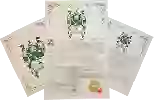
Winery Orsan VigneronsCuvée du Troisième 3e age Côtes-du-Rhône
This wine generally goes well with beef, game (deer, venison) or lamb.
Food and wine pairings with Cuvée du Troisième 3e age Côtes-du-Rhône
Pairings that work perfectly with Cuvée du Troisième 3e age Côtes-du-Rhône
Original food and wine pairings with Cuvée du Troisième 3e age Côtes-du-Rhône
The Cuvée du Troisième 3e age Côtes-du-Rhône of Winery Orsan Vignerons matches generally quite well with dishes of beef, lamb or game (deer, venison) such as recipes of venison leg in casserole, moussaka with spices or paella valenciana (without seafood).
Details and technical informations about Winery Orsan Vignerons's Cuvée du Troisième 3e age Côtes-du-Rhône.
Discover the grape variety: Mourvèdre
Mourvèdre noir is a grape variety originating from Spain. It produces a variety of grape specially used for wine making. It is rare to find this grape to eat on our tables. This variety of grape is characterized by medium to large bunches, and grapes of medium size. Mourvèdre noir can be found in several vineyards: South-West, Cognac, Bordeaux, Provence & Corsica, Rhône valley, Languedoc & Roussillon, Loire valley, Savoie & Bugey, Beaujolais.
Informations about the Winery Orsan Vignerons
The Winery Orsan Vignerons is one of of the world's greatest estates. It offers 8 wines for sale in the of Côtes-du-Rhône to come and discover on site or to buy online.
The wine region of Côtes-du-Rhône
The wine region of Côtes-du-Rhône is located in the region of Rhône méridional of Rhone Valley of France. Wineries and vineyards like the Château de Beaucastel or the Chateau de Fonsalette produce mainly wines red, white and pink. The most planted grape varieties in the region of Côtes-du-Rhône are Mourvèdre, Viognier and Marsanne, they are then used in wines in blends or as a single variety. On the nose of Côtes-du-Rhône often reveals types of flavors of pineapple, red plum or sour cherry and sometimes also flavors of truffle, juniper or clove.
The wine region of Rhone Valley
The Rhone Valley is a key wine-producing region in Southeastern France. It follows the North-south course of the Rhône for nearly 240 km, from Lyon to the Rhône delta (Bouches-du-Rhône), near the Mediterranean coast. The Length of the valley means that Rhône wines are the product of a wide variety of soil types and mesoclimates. The viticultural areas of the region cover such a distance that there is a widely accepted division between its northern and southern parts.
The word of the wine: Fleshy
Said of a wine that gives the impression of being dense and smooth, a bit like biting into the flesh of a ripe fruit.














